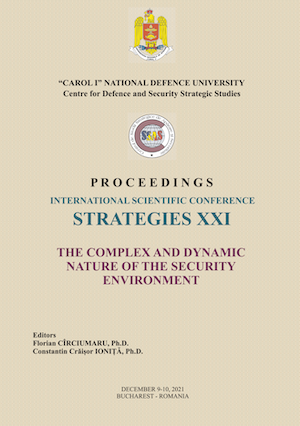NEW CHALLENGES FOR A FUTURE STATE DEFENCE
NEW CHALLENGES FOR A FUTURE STATE DEFENCE
Author(s): Fabian Baxa, Aleš Tesař
Subject(s): Politics / Political Sciences, Politics, Law, Constitution, Jurisprudence, International Law, Security and defense, Military policy, ICT Information and Communications Technologies
Published by: Carol I National Defence University Publishing House
Keywords: advanced technologies; armed conflict; commercial companies; international law; private security companies;
Summary/Abstract: There is an increasing number of non-state actors acting recently as well as present armed conflicts aside of state actors when non-state actors being endowed with more economic and “military” power than smaller states what enable them a broad spectrum of activities in all domains explored by human civilisation. Nowadays even an inner space belongs already to activities of non-state actors. Cyber space is an arena of these actors since the beginning of its exploitation. Putting together, it is necessary to expect a growing number of frictions among various state and non-state actors having their own interests in the same areas and time. These frictions may lead to conflicts, even armed conflicts being presented by other activities than engagement of traditional armed forces against property or interests of both, state or non-state actors with an aim to gain some advantage. Actions in an inner space or in a cyber space could be more serious than small scale armed conflict. These actions might be considered as simple criminal or terroristic acts or as casus belli, like consequences of the 11th September 2001 situation. Who is in charge of judging a nature of the offensive actions between two non-state actors? What state is authorised to declare “war against terrorism” (or criminality?) towards one or all belling parties, which are non-state actors? This situation can arise more questions and this article has an ambition to elaborate some of them to address new challenges in the field of future state defence.
- Page Range: 194-204
- Page Count: 11
- Publication Year: 2021
- Language: English
- Content File-PDF

